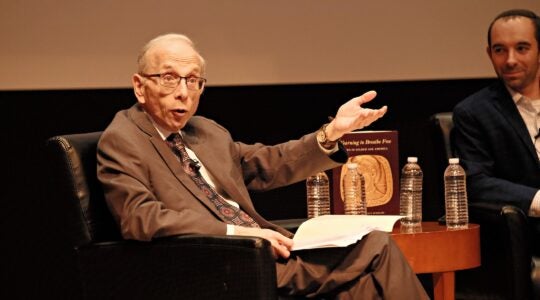All I hear about these days is the “New Anti-Semitism.” The Anti-Defamation League’s Abe Foxman had a book some years ago — a rather gevaltist book — with the Kahanist title “Never Again? The Threat of the New Anti-Semitism.” Phyllis Chesler had a book on the “New Anti-Semitism.” Even Alexander Cockburn, of all people, weighed in. Comes now the “flotilla” crisis and anti-Israel demonstrations in Britain, the leadership vacuum in Israel, the Helen Thomas flap (Jews: Go back to Poland?) — not only is it tough to find friends, but they all hate us out there.
Or do they?
Back in the day of serious anti-Jewish violence in 2002 and the first half of 2004, it became fashionable to talk about the “New Anti-Semitism.” Indeed, if there was any such thing as a “New Anti-Semitism,” it was new in the sense that it would not fit the patterns of ancient anti-Semitism, which was primarily cultural in nature; Christian anti-Semitism, which was religious; or modern anti-Semitism, which was the racial anti-Semitism of the 19th and 20th centuries.
What is new, as we are entered into the second decade of the 21st-century? There has to be more to say than “The French hate us,” and “The Muslims hate us.”
In fact, there is much more to say. Anti-Semitism, the political scientists tell us, is historically linked to the political contours of each era, and of each country during a given era. The physiognomy of European anti-Semitism in any given time is a function of the primary political challenge facing Europeans in that time and place. (This, by the way, is Hannah Arendt’s unique insight in Volume I of “The Origins of Totalitarianism.”) Examples abound: nationalism in the 19th century bred racialist anti-Semitism. Augustine’s anti-Aristotelian Christianity bred religious anti-Semitism. And so on.
As the primary political challenge for Europe today is that of moving beyond the nation-state — that is, the problem of European integration, a problem that is framed in the clash between nationalism and post-nationalism — it comes as no surprise that Israel (and America) are reviled for acting like the nation-states they are. Israel, as the product of 19th-century European nationalism, so goes the argument, acts as the ideology of nationalism suggests sovereign states do and should act: it is ready to employ the force of arms to defend the nation’s interest.
This behavior is what drives the European intelligencia crazy. It strikes their post-nationalist sensibilities as retrograde and racist. Israel squares off against the Arabs in the same benighted manner as the French used to against the Germans. Hence, European anti-Semitism, and of course anti-Americanism as well.
In this regard, Zionism, the darling of the Left 70 years ago, became successful — that is, created a nation-state — precisely at a time when the nation-state fell out of fashion. It’s one of the great ironies of history.
What’s new, then, about international/political anti-Semitism today are three things: First, the collective expression of anti-Semitism, with Israel as a focal point, rather than the individual animus of the past. This leads, of course, to the claim of distinguishing between anti-Israelism and anti-Semitism. Second, the center of gravity of anti-Semitism is now in the Islamic world. Finally, what is new is also very old, going back to early Christian times: the “double-standard” — the assertion that Jews may not defend themselves as others may. If this is the case, then by extension the legitimacy of a Jewish historical particularism, a Jewish historical identity, is challenged. Deriving from this, of course, is the isolation of the State of Israel and the relegation of Israel to the status of “pariah state.”
All of which leads to a question: At what point does anti-Israel rhetoric become anti-Semitism? Criticism of the policies of the government of the State of Israel — indeed harsh criticism — is entirely legitimate. The Israeli public is itself deeply divided over the peace process; and beyond this, over its relations today and tomorrow with the Palestinians. The point at which such attacks become anti-Semitism is the point at which the legitimacy of the Zionist enterprise or the State of Israel is questioned — because then the legitimacy of Jewish peoplehood is questioned.
But a distinction must be made between Israelophobia or “anti-Israelism” and anti-Semitism. Anti-Israelism is a concerted prejudice against Israel, birthed in large measure by Leftist anti-globalist politics, but (so the argument goes) without a discernable hatred of Jews. Oppression and liberation, oppressors and oppressed — it’s another riff on the political rivalries that characterized much of ancient anti-Judaism. Is there a specifically anti-Jewish bias here? Perhaps what motivates the Israelophobes is anti-Semitism. But to tar all critics of Israel with the brush of anti-Semitism is unfair, so the argument goes, and may be counterproductive.
Leon Wieseltier has written that the analysis of anti-Semitism must take place somewhere between the indifferent and the hysterical. The biggest danger with respect to assessing anti-Semitism is an internal danger. The “cult of victimization” is less attractive, and more coarsening, when viewed in our own community. It was never true that adversity was what held Jews together, that anti-Semitism was what kept Jews “Jewish.” This fallacy has a long history. In our tormented history, we Jews did not instill our torments at the heart of our identity. We were never reduced by our suffering. Vitality, not morbidity, has been the defining Jewish characteristic.
Jerome A. Chanes is the author of “A Dark Side of History: Antisemitism through the Ages” and editor of the forthcoming “The Future of American Judaism.”
|
Signup for our weekly email newsletter here. Check out the Jewish Week’s Facebook page and become a fan! And follow the Jewish Week on Twitter: start here. |
The New York Jewish Week brings you the stories behind the headlines, keeping you connected to Jewish life in New York. Help sustain the reporting you trust by donating today.




